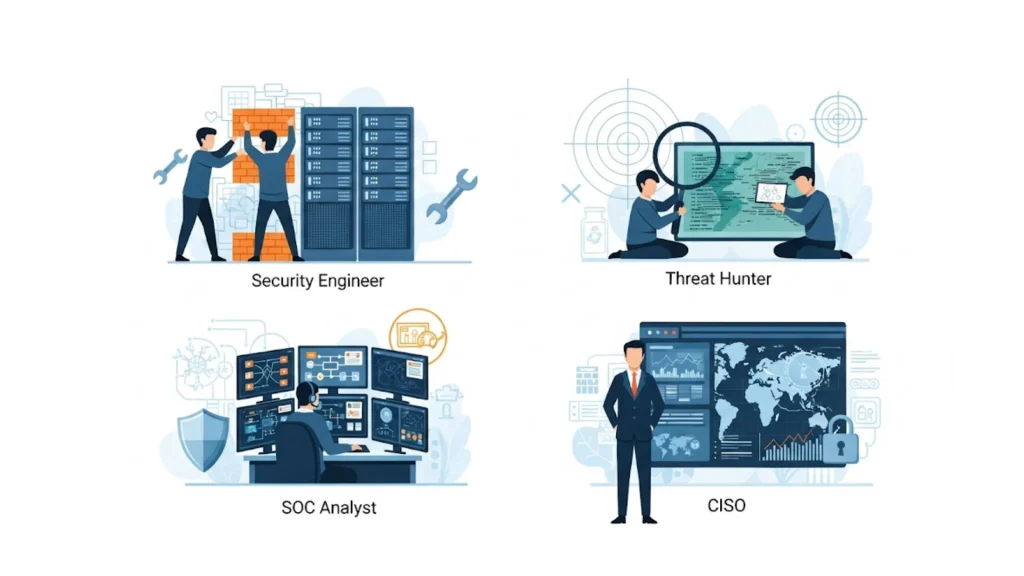In today’s rapidly evolving digital world, Cybersecurity Job Roles are more important than ever. From defending networks against cyberattacks to managing enterprise-wide security strategies, each position plays a unique role in safeguarding data and systems. Whether you’re just starting your career or aiming for leadership, understanding these roles will help you map out a successful path in cybersecurity.
What Are the Main Cybersecurity Job Roles?

The field of Cybersecurity Job Roles spans a wide spectrum, ranging from real-time monitoring to executive-level security planning. Some positions focus heavily on technical problem-solving, while others emphasize policy-making, compliance, and team leadership.
Cybersecurity roles can generally be divided into three main categories:
- Entry-Level Roles – Designed for newcomers to the field, focusing on threat monitoring, log analysis, and basic incident handling.
- Mid-Level Roles – More specialized positions involving network security design, penetration testing, and proactive threat hunting.
- Leadership Roles – High-level positions that guide an organization’s overall security posture, manage teams, and align strategies with business goals.
Recognizing which Cybersecurity Job Role fits your current skills can help you choose the right training, certifications, and career path.
Entry-Level Cybersecurity Job Roles

Entry-level cybersecurity positions are perfect for those breaking into the industry. They allow you to build foundational technical skills, understand security workflows, and gain exposure to real-world cyber threats. These roles often involve working within a Security Operations Center (SOC) or assisting senior analysts with investigations.
SOC Analyst, Security Analyst
A SOC Analyst works within a dedicated Security Operations Center, monitoring networks, systems, and applications for suspicious activities. They respond to alerts generated by SIEM (Security Information and Event Management) tools and escalate incidents to senior teams when necessary. As an entry role SOC analysts still enjoy much respect in the general cyber security industry, this role offers a strong career path and great compensation.
A Security Analyst has a slightly broader scope, conducting vulnerability assessments, evaluating security measures, and contributing to risk mitigation strategies.
Essential skills for these roles:
- Familiarity with SIEM platforms such as Splunk or QRadar
- Understanding of TCP/IP networking, firewalls, and intrusion detection systems
- Strong analytical thinking for incident triage and root cause analysis
Mid-Level Cybersecurity Job Roles
Mid-level Cybersecurity Job Roles are for professionals who already have hands-on experience and want to focus on more complex tasks. These roles often require a deeper understanding of attack methodologies, security architecture, and advanced analysis techniques.
Security Engineer, Threat Hunter

A Security Engineer is responsible for designing and maintaining an organization’s security infrastructure. They implement tools like firewalls, intrusion prevention systems, and endpoint protection platforms, ensuring these defenses stay updated and effective.
A Threat Hunter goes beyond reacting to alerts—they proactively search for hidden, advanced threats that automated tools might miss. This role involves deep knowledge of malware behavior, adversary tactics, and cyber threat intelligence.
Essential skills for these roles:
- Expertise in secure network and application architecture
- Scripting and automation with Python, Bash, or PowerShell
- Forensic analysis and incident remediation techniques
Leadership Cybersecurity Job Roles
Leadership roles in cybersecurity involve setting the vision, managing teams, and ensuring an organization’s security strategy aligns with its business objectives. These positions demand both technical understanding and strong leadership capabilities.
Security Manager, CISO
A Security Manager oversees the daily security operations, manages security teams, and ensures compliance with industry standards and regulations.
A CISO (Chief Information Security Officer) operates at the executive level, developing enterprise-wide security policies, managing budgets, and presenting security strategies to the board. They must balance technical realities with business priorities. As Cybersecurity Job Roles are considered this stands as the cream of the crop and enjoys compensation deserving of the position.
Essential skills for these roles:
- Risk assessment and governance
- Strategic security planning and policy development
- Effective communication with both technical teams and executives
Career Path Progression in Cybersecurity

One of the best ways to understand Cybersecurity Job Roles is to see how they fit together in a typical career journey. While every path is unique, most professionals follow a progression that builds technical skills first, then moves toward strategic and leadership responsibilities.
Typical Cybersecurity Career Ladder:
| Career Stage | Common Roles | Average Experience Needed | Focus Areas |
| Entry-Level | SOC Analyst, Junior Security Analyst | 0–2 years | Monitoring, incident triage, basic threat analysis |
| Mid-Level | Security Engineer, Threat Hunter, Pen Tester | 2–5 years | Advanced defense, proactive threat detection, secure architecture |
| Senior-Level | Senior Security Engineer, Security Architect | 5–8 years | Complex system design, compliance, team leadership |
| Leadership | Security Manager, CISO | 8+ years | Strategy, policy, risk management, executive decision-making |
Skills and Certifications Required for Each Role
Success in different Cybersecurity Job Roles depends on both technical expertise and relevant certifications. Here’s a breakdown:
- SOC/Security Analyst: CompTIA Security+, EC-Council Certified SOC Analyst (CSA), CompTIA Cybersecurity Analyst (CySA+)
- Security Engineer/Threat Hunter: Certified Ethical Hacker (CEH), GIAC Certified Incident Handler (GCIH), GIAC Cyber Threat Intelligence (GCTI)
- Security Manager/CISO: CISSP (Certified Information Systems Security Professional), CISM (Certified Information Security Manager), ISO 27001 Lead Implementer
Alongside certifications, practical experience—through labs, internships, or real-world projects—is critical for advancing in the cybersecurity field.
How to Choose the Right Cybersecurity Specialization
With so many Cybersecurity Job Roles available, it can be challenging to decide which path is best for you. The right specialization depends on your skills, interests, and long-term career goals.
1. Identify Your Strengths and Interests
- Analytical & investigative? You might enjoy threat hunting, incident response, or digital forensics.
- Technical & hands-on? Security engineering, penetration testing, or network defense may be a better fit.
- Strategic & leadership-focused? Roles like Security Manager or CISO could be your ultimate goal.
2. Explore Different Roles Early
Starting in an entry-level position like a SOC Analyst exposes you to multiple areas, making it easier to see where your passion lies.
3. Match Certifications to Your Chosen Path
- Technical track: CEH, OSCP, CompTIA CySA+, GIAC certifications.
- Management track: CISSP, CISM, ISO 27001 Lead Implementer.
4. Consider Industry Needs
Some industries (finance, healthcare, government) have unique cybersecurity demands. Specializing in one sector can make you a highly sought-after expert.
Pro Tip: Many successful cybersecurity professionals combine technical depth with strategic understanding. Even if you aim for leadership, having a technical foundation can give you an edge.
Technical vs. Strategic Cybersecurity Job Roles
In the cybersecurity industry, Cybersecurity Job Roles generally fall into two main categories: technical and strategic.
- Technical Cybersecurity Job Roles focus on hands-on defense, such as configuring firewalls, performing penetration testing, and conducting threat hunting operations. These roles demand strong technical skills, in-depth knowledge of security tools, and the ability to respond quickly to incidents.
- Strategic Cybersecurity Job Roles center on long-term planning, policy development, and risk management. Professionals in these roles, such as Security Managers and CISOs, create frameworks that guide an organization’s entire security posture.
Balancing both technical and strategic expertise can make you stand out in competitive Cybersecurity Job Roles, opening doors to higher-level positions and leadership opportunities.
Frequently Asked Questions
Q: What is the difference between a SOC analyst and security analyst?
A SOC analyst focuses on real-time monitoring and incident escalation within a SOC, while a security analyst performs broader tasks like vulnerability assessments and security planning.
Q: How do I become a cybersecurity engineer?
Start with an entry-level security role, strengthen your knowledge of networking and system security, and earn certifications such as CEH or CySA+.
Q: What qualifications are needed for CISO roles?
A CISO typically needs 8–15 years of security experience, leadership skills, and certifications like CISSP or CISM. Many also hold advanced degrees in information security or business management.
Start Your Cybersecurity Career Today
The demand for skilled professionals in Cybersecurity Job Roles is increasing every year. Whether you want to become a SOC Analyst, a Security Engineer, or a CISO, the right training can give you a competitive edge.
Don’t just read about these roles—start preparing for them today. Join our comprehensive cybersecurity program, gain hands-on SOC experience, and position yourself for high-demand roles like Security Engineer or CISO.
Bilişim Academy offers a comprehensive Cyber Security Course taught by seasoned instructors, including internationally recognized certifications. The program prepares you for real-world challenges in SOC operations, security engineering, and leadership roles.
In collaboration with our trusted SEO and Media Planning partner, we ensure our programs reach the right audience across digital platforms—so you can be confident you’re learning from a globally recognized and widely respected institution.




